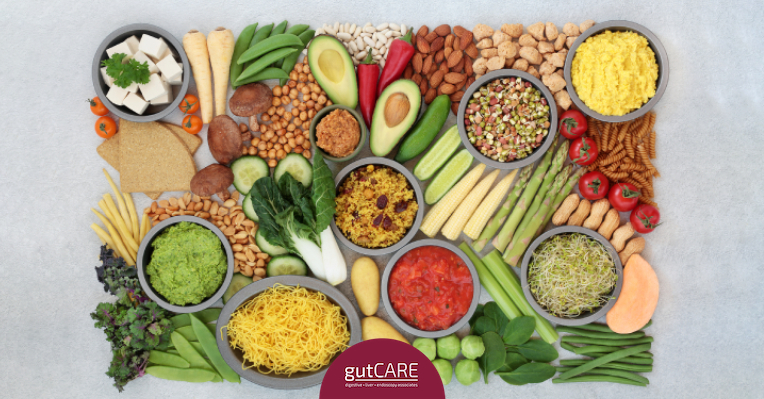7 Reasons To Convince You To Consume Sufficient Fibre

Fibre might not be the first thing people look for when they look at a food nutrition label. Most, especially those watching their blood glucose level, would look out for the number of total carbohydrates or added sugar. Or maybe those who are looking for muscle recovery after an intense workout might look out for protein amount.
While fibre content might not be the first thing you could look for, it will likewise not do you any good should you ignore it too.
How does fibre benefit your body?
Most individuals, when asked about the benefits of consuming high-fibre-content food, will associate it with the prevention of constipation. While it does play a massive role in maintaining good GI health, the benefit of fibre extends beyond that.
Here are seven fundamental benefits of fibre:
1. Builds a happy, diverse gut microbiome
Fibre, unlike other food components, does not get digested in our stomach. Instead, it passes through to our colon, where it feeds the beneficial gut microbiome. Having a high-fibre-content diet means that you are able to build a healthy gut environment for the microbiome to thrive.
2. Encourages regular healthy bowel movements
More often than not, we do not take our bowel movements seriously until they occur either too little, constipation, or, too often, diarrhoea. Fibre can help to regulate and prevent such problems from happening. There are many types of fibre, such as viscous, insoluble, and soluble. Each plays a different role in promoting healthy bowel movements. For example, whole grains, which contain a high amount of insoluble fibre, help to keep your stool soft while bulking it up.
3. Enables you to be full for an extended period
Fibre takes a longer time to break down than other nutrients. Hence, it is able to keep you full for a longer time. Incorporating fibre not only into your meals but also into your snacks can help you maintain fullness in between meals. This may be extra beneficial, especially if you have a tendency to overeat.
4. Helps to lower high blood pressure
Studies have shown that daily consumption of the recommended amount of fibre helps to improve individuals with high blood pressure, which at the end of the day, can also lead to a lowered risk of developing stroke and heart disease.
5. Achieved balanced cholesterol level
Viscous fibre has a binding capability that is able to trap excess cholesterol and bile in our GI tract, which is eliminated when we visit the bathroom. This unique capability helps us to maintain a healthy cholesterol level, which leads to a healthier heart. Soluble fibre also benefits in reducing LDL cholesterol levels, which can accumulate in our blood vessels, leading to atherosclerosis, which is the narrowing and hardening of the arteries. One example of a food with high soluble fibre content is oatmeal.
6. Prevent spike in blood sugar level
Besides reducing LDL cholesterol levels, soluble fibre also regulates our blood sugar levels. It slows down the absorption rate at which our body breaks down glucose, preventing spikes in blood sugar levels. This can significantly improve control over blood sugar which in turn reduces the development of type 2 diabetes.
7. Lower risk of development of diseases
Daily sufficient consumption of fibre helps to prevent the development of certain diseases, such as:
- Type 2 diabetes
- Colorectal cancer
- Heart disease
What is the recommended daily intake of fibre?
In Singapore, the recommended amount of fibre we need to consume daily is 26g for men and 20g for women. The quickest way to incorporate a high-fibre diet into our daily lives is to consume more plant foods, such as vegetables, legumes, grains, nuts, and fruits. Fruits should be consumed with their skin instead of juicing or peeling them. Consuming more whole grains like brown rice also ensures that you meet the recommended daily intake.
Is it possible to consume too much fibre?
Yes. Too much fibre might not be a good thing as it can end up irritating the GI tract. This may result in you experiencing bloating symptoms, diarrhoea symptoms, cramping symptoms, and constipation symptoms. This is because fibre tends to pull water into our GI tract. Hence, if you consume too much fibre but too little water, it leads to dehydration and increases the risk of getting constipation. Hence, while it is essential to look out for fibre content in the nutrition label, it is also highly recommended to look out for the exact amount.
Conclusion
Having a high-fibre-content diet is essential for a healthy gut system. However, too much of good things might not be beneficial for our bodies. At the end of the day, it is about finding the right balance. And that includes going for regular gastroenterology health check-ups. Should you be looking for medical or diet advice, look no further than GUTCARE. We also provide other treatments, such as haemorrhoid treatment and colon cancer treatment. With that, we want to help you achieve and maintain healthy gut care. For more information, you may do so by contacting us at https://www.gutcare.com.sg.

HAVE AN ENQUIRY?
You may also send in an enquiry via our online form if you have questions pertaining to your visit or consultation.

FIND OUT MORE ABOUT OUR DOCTORS
Unsure of which doctor to speak to? Take a look at our doctors’ profile to find out more.




